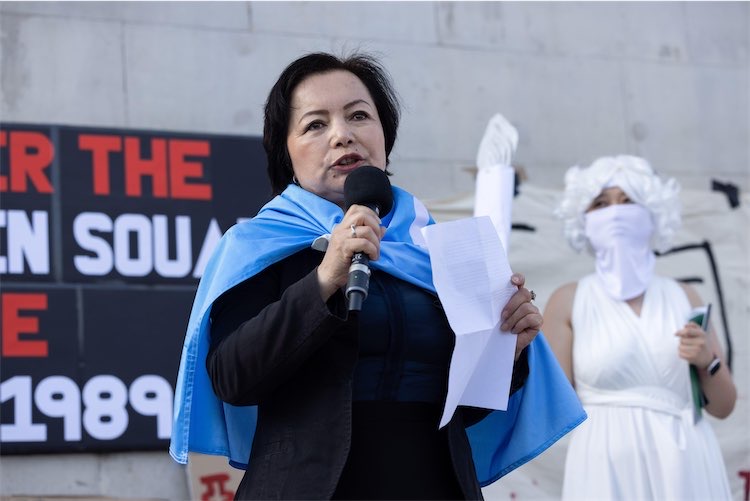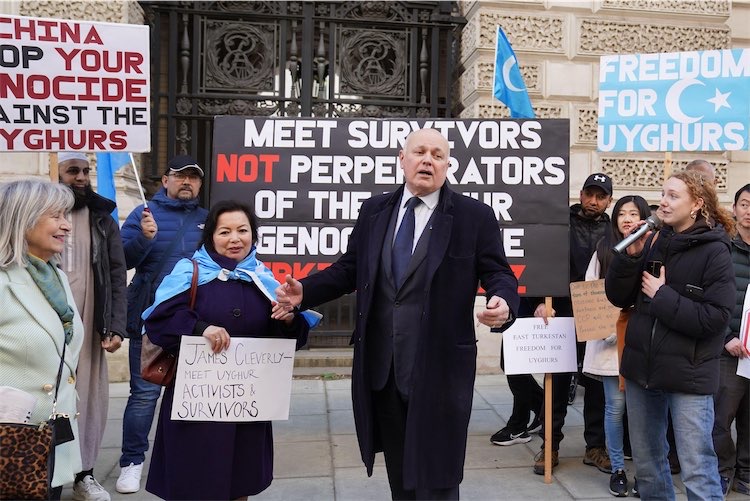Uyghur Rights Leader Demands Action Against Forced Labour In Election Manifestos
China has incarcerated an estimated one million Turkic muslims in internment camps since 2014 (Alamy)
7 min read
A leading Uyghur human rights campaigner has urged both the Conservatives and Labour to include legislation in their party manifestos to ban the import of goods connected with forced labour.
The Chinese Communist Party (CCP) has committed a series of human rights abuses against ethnic minorities in the Chinese autonomous region of Xinjiang, incarcerating an estimated one million Turkic muslims, including Uyghurs, in internment camps since 2014, subjecting them widespread forced labour, suppressing religious practices, and carrying out forced sterilisation, contraception, and abortion.
Rahima Mahmut is the UK director of World Uyghur Congress, the executive director of the charity Stop Uyghur Genocide, an adviser to the Inter-Parliamentary Alliance on China, and works as a singer and interpreter. She was among a group of activists who were honoured by the King at a reception at Buckingham Palace in November last year to recognise British contributions to global humanitarian efforts.
The leading activist told PoliticsHome that this year, her focus is to do everything she can to persuade the UK government to tackle the importing of goods connected with Uyghur slave labour and the abuse of technology by the Chinese state. The production of solar panels and cotton goods in particular have been connected to the use of forced labour.
“In my opinion the UK government is still sleepwalking, and not really doing much, especially on solar panel procurements,” she said.
“The UK has become a dumping ground for these goods.”
 Rahima Mahmut has worked with and interpretted accounts from Uyghur camp survivors (Alamy)
Rahima Mahmut has worked with and interpretted accounts from Uyghur camp survivors (Alamy)
Mahmut highlighted legislation in the United States, the Uyghur Forced Labor Prevention Act (UFLPA), that was enforced in 2021 and put into law that all goods manufactured in Xinjiang are assumed to have been made with forced labour and requires firms to disclose their dealings with Xinjiang.
“We want to see that also implemented in this country,” Mahmut said.
“We want the UK to introduce tougher legislation against forced labour companies, so they are limiting the companies’ abilities to import any goods that are tainted by Uyghur forced labour from solar to cotton goods, blacklisting these high tech companies."
She explained that the high tech industry should be of particular concern, both in its use of forced labour but also in its use to oppress the Uyghurs and other minorities.
“If the Holocaust was the first industrial genocide, the Uyghur genocide is the first high tech genocide,” Mahmut said, describing how Uyghurs over the age of 12 get summoned for “health checks” without their consent to collect their DNA and health information.
A Byline Times investigation last year reported that at least 16 UK universities have done joint work with Chinese genomics company BGI Genomics, which is part of the state surveillance that facilitates the mass detention of Uyghurs.
Mahmut insisted that simply holding conversations with the CCP “doesn’t work” and that the UK and other Western governments should understand that engaging with China on trade does not help to address human rights abuses.
“The problem is the more powerful economically China became, the human rights situation became worse since the Cultural Revolution,” she continued.
“The Conservative government is always very loud in words but very lacking in action. That’s why, whether Conservative or Labour win [the general election], part of our campaign now is that we want this in their manifestos.
“In the end, whoever wins, it will be a new government, a new start and therefore I do believe we just have to try and we want to see those kinds of commitments and actions.”
In March 2021, a business select committee report concluded that the UK government must do more to meet its commitments to uphold human rights in relation to businesses with links to China, and said the Business and Trade Department had “shown little sign that it is taking a proactive or meaningful lead” on investigating UK business links to forced labour and other human rights abuses in China or elsewhere.
Since then, the King’s Speech in November 2023 set out a commitment to update legislation to increase the accountability of companies to drive out modern slavery from their supply chains. However, a standalone bill for Modern Slavery will not be introduced this year due to a lack of parliamentary time.
A government spokesperson said: “We have set out clear guidance for businesses on the risks of doing business in Xinjiang and have enhanced the UK’s export controls to include China in the list of destinations subject to an arms embargo.
“We are taking robust action to tackle Uyghur forced labour in supply chains and continue to work closely with our international partners to stamp out this barbaric crime.”
While Mahmut plans to continue putting pressure on the government, she is also turning her attention to the Labour Party and the UK’s major trade unions, including Unison and GMT, who she said “want to do more” around Uyghur forced labour.
Describing this year as a crucial moment with a general election on the horizon, Mahmut said she hoped that engaging with unions will put the issue higher up on a potential future Labour government’s agenda, as the “principle of the trade unions is equality free from slave labour, and workers rights”.
Mahmut said that unlike the Conservative government, Labour’s Shadow Foreign Secretary David Lammy had referred to the persecution of the Uyghurs as “genocide”: a position which she urged him to continue if Labour get into power.
In 2021, British MPs voted in favour of declaring that China is committing genocide against the Uyghur people, with Beijing’s embassy responding by accusing the MPs of passing the motion “with a view to discrediting and attacking China”.
 Rahima Mahmut joined Tory MP Iain Duncan Smith and Labour peer Helena Kennedy at a vigil outside the Foreign Office last year (Alamy)
Rahima Mahmut joined Tory MP Iain Duncan Smith and Labour peer Helena Kennedy at a vigil outside the Foreign Office last year (Alamy)
While the then-Minister for Asia Nigel Adams admitted there was credible evidence of widespread use of forced labour and internment camps, he said the UK would not label it genocide unless it was ruled as such by “competent national and international courts”.
Mahmut praised MPs who had shown their support, but criticised the government for its stance that an international court has to make the decision, “despite knowing there is no such court available for us”.
“It is extremely important that whoever is being elected, we want to see the manifesto language that includes the Uyghur genocide recognition,” she said.
“Only when they recognise that, then they will have to follow the obligation that is a signatory of the UN Convention on the Prevention and Punishment of the Crime of Genocide.”
Born in Xinjiang herself, Mahmut has lived in exile in the UK for more than 20 years. A former college lecturer, Mahmut left her homeland after being subjected to heightened surveillance and threats from colleagues and the CCP in the aftermath of a massacre of Uyghur young protesters in 1997.
She told PoliticsHome that she feels it is her responsibility to speak for those who remain there and have “no possibility to be able to say anything for themselves”.
“The only goal in this country where I am a citizen, is that my activities can make some difference, that we could achieve some policy changes that might help my people over there,” she explained.
The last contact she was able to make with any member of her family in Xinjiang was in January 2017, when she managed to get through to her eldest brother. She was told never to contact them again.
“He said ‘please leave us in God's hands’,” Mahmut recalled.
“Imagine you’re suddenly cut off from family… in the 21st century social media and phone calls are so easy but I dare not call them because of voice and facial recognition.
“The Uyghurs are completely tracked, they [the CCP] track everything.”
